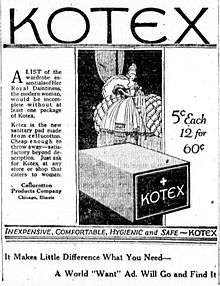Kotex

Kotex is a brand of feminine hygiene products, which includes the Kotex maxi, thin and ultra thin pads, the Security tampons, and the Lightdays pantiliners. Most recently, the company has added U by Kotex to its line of feminine hygiene products.[1] Kotex is owned and managed by Kimberly-Clark, a consumer products corporation active in more than 80 countries.
The modern, commercial, disposable pads seem to have started in the late nineteenth century with the Hartmann company in Germany, and Johnson & Johnson in the United States.[2] In the United States, Kotex was launched in 1920 by Kimberly-Clark to make use of leftover cellucotton (wood pulp fiber) from World War One bandages.[3][4] Kotex became well known in the 1920s after Kimberly-Clark placed advertisements in Good Housekeeping magazine. Although some readers were offended by the ads, the products' success led to more advertisements. Kimberly-Clark also promoted Kotex in Good Housekeeping by using intimate advice columnist Mary Pauline Callender.[5]
Originally sold in a hospital blue box at 12 for 60 cents, Victorian sexual prudishness caused slow acceptance until Montgomery Ward began advertising them in its 1926 catalog, reaching $11 million sales in 1927 in 57 countries.[6] It became one of the first self-service items in American retailing history after it was strategically placed on countertops with a special payment box so that the woman didn't have to ask a clerk for it and touch hands. Tampax appeared in 1936. Belts were needed until the 1970 introduction of Stayfree by Personal Products Co. and New Freedom Pads by Kimberly-Clark.
In August 2009 Kotex launched a premium sub-brand called Kotex Luxe in Singapore. It launched U by Kotex Tween, products aimed at girls aged 8-12 in the US in 2011.[7]
In September 2012 Kimberly-Clark issued a warning regarding a shipment of rejected Kotex tampons that had been stolen and sold to the public. The company said that the defective products posed only a minor health risk to consumers.[8]
New Freedom is a former brand in the Kotex family. New Freedom was one of the first beltless pads manufactured in the early 1970s.
In popular culture
Quest Deodorant Powder for Sanitary Napkins,[9] a feminine hygiene product formerly made by Kotex, is featured prominently in the Mad Men episode "Collaborators" (season 6 episode 3, air date 14 April 2013). Peggy Olson (Elisabeth Moss) finds a container of Quest on her desk, along with a folder detailing three talk points about the product, one of which details the target audience: "working women and other Olsons". Peggy mistakes the practical joke as an actual assignment from her boss, Ted Chaough (Kevin Rahm), who has to explain her copywriters have "pranked" her. The end of the episode shows that Peggy has saved the product in her top desk drawer.[10]
Notes
- ↑ Newman, Andrew Adam (16 March 2010). "Rebellion Against the Usually Evasive Feminine Care Ad". The New York Times. p. B3. Retrieved 17 June 2015.
- ↑ "Pads [Directory]". Museum of Menstruation. Retrieved 17 June 2015.
- ↑ www.mum.org
- ↑ www.mum.org
- ↑ "Photo of Mary Pauline Callender". Museum of Menstruation. Retrieved 17 June 2015.
- ↑ http://www.straightdope.com/columns/read/2252/who-invented-tampons
- ↑ Newman, Andrew Adam (14 April 2011). "A Younger Group for Feminine Products". The New York Times. p. B3. Retrieved 17 June 2015.
- ↑ "Kimberly-Clark issues warning about stolen tampons". USA Today. Associated Press. 5 September 2012. Retrieved 17 June 2015.
- ↑ "Quest Deodorant Powder for Sanitary Napkins". Museum of Menstruation. Retrieved 14 April 2013.
- ↑ "Collaborators". Mad Men. Season 6. Episode 3. 14 April 2013. AMC.
References
- Marchand, Roland (1985). Advertising the American Dream: Making Way for Modernity, 1920–1940. Berkeley, Cal.: University of California Press. pp. 20–23 et al. ISBN 9780520052536. OCLC 11574067.
Further reading
- "The Accidental History of Kleenex & Kotex". Alan's Mysterious World. September 30, 2009. Retrieved 17 June 2015.
- Mikkelson, Barbara (May 19, 2011). "Padded Account". Snopes.com. Retrieved 17 June 2015. On the origin of Kotex sanitary napkins. Cites:
External links
- Kimberly-Clark corporate website
- Kotex corporate website
- Girlspace: Kotex website for teen girls
- U by Kotex
- Kotex Singapore
- Kotex in Russia